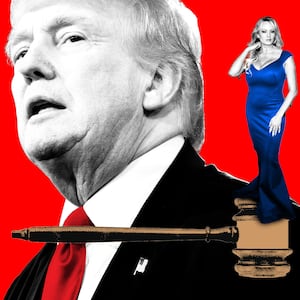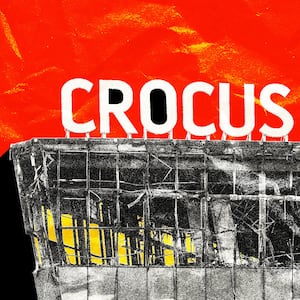Donald Trump’s lawyers are playing legal whack-a-mole to try to help the former president continue to avoid accountability for several decades of alleged illegal activity.
In two different New York courts on Monday, Team Trump seemed to have won a bit of a victory in one, but certainly not in the other. While Trump’s camp is likely relieved that he doesn’t have to post a nearly half-billion-dollar bond to continue his appeal, the fact remains that both that case and the Stormy Daniels hush money case are still moving full steam ahead.
Earlier this year, New York Supreme Court Justice Arthur Engoron found that the former president, family members, and many of the companies they run engaged in massive fraud against lenders, other companies, and government entities. According to that ruling, the defendants benefited from the ways in which they falsely stated the value of many properties in order to get more advantageous loan terms.
The award was based in part on the ill-gotten gains from that fraud: the interest payments the Trump Organization saved by getting those favorable terms. In addition to the finding of the harm from this fraud itself, the defendants were tagged—like most litigants in New York who lose—with interest on that judgment, from the day the illegal windfall first started bestowing benefits on the defendants.
Now that might not sound like a big deal, but, according to statute in New York, a judgment creditor—as the people of the State of New York are in this case—gets to earn 9 percent interest on that judgment.
This is perhaps the greatest return on investment ever associated with Trump-related assets. In this civil fraud case, the interest alone tacked on an additional $100 million in damages.
The appellate court in this case said earlier today that to appeal Justice Engoron’s decision, the defendants will still have to post a bond for roughly one-third of the full judgment.
The court did not rule on the merits of the underlying decision, nor did it indicate in any way that the court will reverse all or even any part of Justice Engoron’s prior ruling. What is more, one of the reasons the appeals court might have allowed the reduction of the bond was that much of the defendants’ assets are not all that difficult to find.
It’s also important to remember, according to the appellate court’s order, the defendants still have to post a bond of $175 million in ten days. Otherwise, they will forfeit the relief obtained in the order, and Attorney General Letitia James can start seizing assets.
Should the appeals court ultimately affirm the lower court’s ruling, in full or even in part, it should not be hard for the attorney general to collect on that judgment.
And while the appellate court did stay some of the restrictions on the defendants and their companies that Justice Engoron imposed in his initial ruling, that court left the court-appointed monitor in place, former federal judge Barbara Jones. She will certainly watch the defendants’ conduct closely to ensure that they do not try to hide any assets. Even so, again, it’s a bit hard to hide Trump Tower, 40 Wall Street, or a golf course.
While Trump can post a lower bond to allow him to appeal the $454 million judgment for alleged fraudulent business practices, his trial in the Stormy Daniels hush-money case will start mid-April, and there seem to be no more tricks up the Trump legal team’s sleeves to delay that from happening.
The trial judge managing that case, Judge Juan Merchan, refused to dismiss the case against Trump for alleged prosecutorial misconduct for the fact that some evidence was not turned over to that team by federal prosecutors. He also took the Trump legal team to task for even suggesting there was any improper conduct on the part of Manhattan District Attorney Alvin Bragg’s office and that Judge Merchan was somehow complicit in it.
Bottom line: Both cases are moving ahead. And judgment day in at least some of the cases currently pending against the former president may be slightly delayed, but it is not far off.









